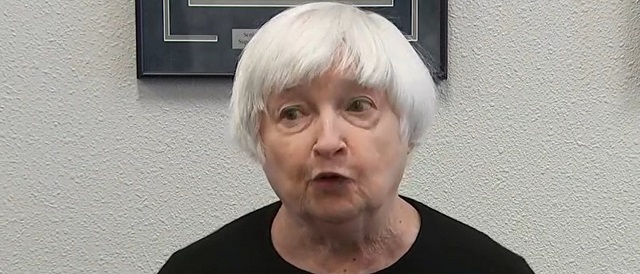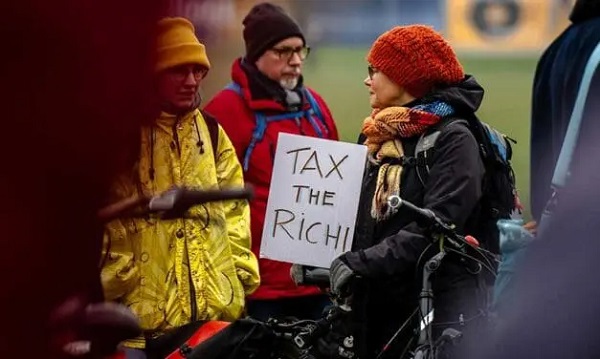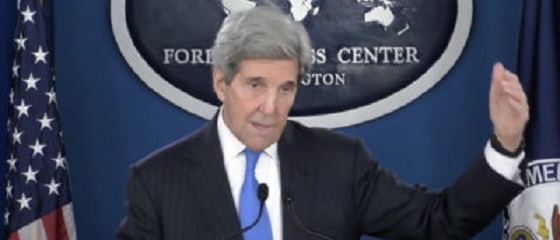Economy
Janet Yellen Calls For $78,000,000,000,000 To Tackle Climate Change

 From the Daily Caller News Foundation
From the Daily Caller News Foundation
U.S. Treasury Secretary Janet Yellen said during a speech in Belem, Brazil, on Saturday that the price tag for a global transition to a low-carbon economy amounts to $78 trillion in financing through 2050.
Yellen said that in order to achieve the goal of net-zero global carbon emissions, there would need to be $3 trillion globally in annual financing for the cause, which she said is a top priority for the Biden administration, according to the speech. In order to contribute to this, Yellen vowed to finance green initiatives in developing countries through multilateral development banks and develop “clean energy technologies.”
“The transition will require no less than $3 trillion in new capital from many sources each year between now and 2050,” Yellen said during the speech. “This can be leveraged to support pathways to sustainable and inclusive growth, including for countries that have historically received less investment.”
“Neglecting to address climate change and the loss of nature and biodiversity is not just bad environmental policy,” Yellen said during the speech. “It is bad economic policy.”
Yellen boasted in her speech about the commitments the Biden administration has put forth toward forwarding these green initiatives to achieve their “climate goals.”
“At home, we are implementing the Inflation Reduction Act, the most significant climate legislation in our nation’s history,” Yellen said during the speech. “It is driving hundreds of billions of dollars of investments in the clean energy technologies and industries that will propel us toward our climate goals and fuel our economic growth.”
The Inflation Reduction Act allocated $370 billion to subsidize climate initiatives like electric vehicles and other technologies that are essential to President Joe Biden’s green agenda.
“Climate change is literally an existential threat to our nation and to the world,” Biden said during a speech addressing climate change in July of 2022. “As President, I’ll use my executive powers to combat climate — the climate crisis in the absence of congressional actions, notwithstanding their incredible action.”
During her speech, Yellen advocated for these climate initiatives to be implemented “beyond our borders.”
“Our ambitions at home are matched by our ambitions abroad,” Yellen said during the speech. “We know that we can only achieve our climate and economic goals — from reducing global emissions to adapting and building resilience, from strengthening markets to bolstering supply chains — if we also lead efforts far beyond our borders.”
The Treasury Department did not immediately respond to a request for comment from the Daily Caller News Foundation.
Business
Canadians love Nordic-style social programs as long as someone else pays for them

This article supplied by Troy Media.
 By Pat Murphy
By Pat Murphy
Generous social programs come with trade-offs. Pretending otherwise is political fiction
Nordic societies fund their own benefits through taxes and cost-sharing. Canadians expect someone to foot the bill
Like Donald Trump, one of my favourite words starts with the letter “T.” But where Trump likes the word “tariff,” my choice is “trade-off.” Virtually everything in life is a trade-off, and we’d all be much better off if we instinctively understood that.
Think about it.
If you yield to the immediate pleasure of spending all your money on whatever catches your fancy, you’ll wind up broke. If you regularly enjoy drinking to excess, be prepared to pay the unpleasant price of hangovers and maybe worse. If you don’t bother to acquire some marketable skill or credential, don’t be surprised if your employment prospects are limited. If you succumb to the allure of fooling around, you may well lose your marriage. And so on.
Failing to understand trade-offs also extends into political life. Take, for instance, the current fashion for anti-capitalist democratic socialism. Pushed to explain their vision, proponents will often make reference to the Nordic countries. But they exhibit little or no understanding of how these societies actually work.
As American economist Deirdre Nansen McCloskey notes, “Sweden is pretty much as ‘capitalistic’ as is the United States. If ‘socialism’ means government ownership of the means of production, which is the classic definition, Sweden never qualified.” The central planning/government ownership model isn’t the Swedish way.
What the Nordics do have, however, is a robust social safety net. And it’s useful to look at how they pay for it.
J.P. Morgan’s Michael Cembalest is a man who knows his way around data. He puts it this way: “Copy the Nordic model if you like, but understand that it entails a lot of capitalism and pro-business policies, a lot of taxation on middle-class spending and wages, minimal reliance on corporate taxation and plenty of co-pays and deductibles in its health care system.”
For instance, take the kind of taxes that are often derided as undesirably regressive—sales taxes, social security taxes and payroll taxes. In Sweden, they account for a whopping 27 per cent of gross domestic product. And some 15 per cent of health expenditures are out of pocket.
Charles Lane—formerly with the Washington Post, now with The Free Press—is another who pulls no punches: “Nordic countries are generous, but they are not stupid. They understand there is no such thing as ‘free’ health care, and that requiring patients to have at least some skin in the game, in the form of cost-sharing, helps contain costs.”
In effect, Nordic societies have made an internal bargain. Ordinary people are prepared to fork over large chunks of their own money in return for a comprehensive social safety net. They’re not expecting the good stuff to come to them without a personal cost.
Scandinavians obviously understand the concept of trade-offs, a dimension that seems to be absent from much of the North American discussion. Instead of Nordic-style pragmatism, spending ideas on this side of the Atlantic are floated on the premise of having someone else pay. And the electorally prized middle class is to be protected at all costs.
In the aftermath of Zohran Mamdami’s New York City win, journalist Kevin Williamson had a sobering reality check: “Class warfare isn’t how they roll in Scandinavia. Oslo is a terrific place to be a billionaire—Copenhagen and Stockholm, too … what’s radically different about the Scandinavians is not how they tax the very high-income but how they tax the middle.”
Taxation propensities aside, Nordic societies are different from the United States and Canada.
Denmark, for instance, is very much a “high-trust” society, defined as a place “where interpersonal trust is relatively high and ethical values are strongly shared.” It’s often been said that it works the way it does because it’s full of Danes, which is broadly true—albeit less so than it was 40 years ago.
Denmark, though, has no interest in multiculturalism as we’ve come to know it. Although governed from the centre-left, there’s no state-sponsored focus on systemic discrimination or diversity representation. Instead, the emphasis is on social cohesion and conformity. If you want to create a society like Denmark, it helps to understand the dynamics that make it work.
Reality intrudes on all sorts of other issues. For example, there’s the way in which public discourse is disfigured on the question of climate change and the need to pursue aggressive net-zero policies.
Asked in the abstract, people are generally favourable, which is then touted as evidence of strong public support. But when subsequently asked how much they’re personally prepared to pay to accomplish these ambitious goals, the answer is often little or nothing.
If there’s one maxim we should be taught from childhood, it’s this: there are no panaceas, only trade-offs.
Troy Media columnist Pat Murphy casts a history buff’s eye at the goings-on in our world. Never cynical – well, perhaps a little bit.
Troy Media empowers Canadian community news outlets by providing independent, insightful analysis and commentary. Our mission is to support local media in helping Canadians stay informed and engaged by delivering reliable content that strengthens community connections and deepens understanding across the country.
Business
Higher carbon taxes in pipeline MOU are a bad deal for taxpayers

The Canadian Taxpayers Federation is criticizing the Memorandum of Understanding between the federal and Alberta governments for including higher carbon taxes.
“Hidden carbon taxes will make it harder for Canadian businesses to compete and will push Canadian entrepreneurs to shift production south of the border,” said Franco Terrazzano, CTF Federal Director. “Politicians should not be forcing carbon taxes on Canadians with the hope that maybe one day we will get a major project built.
“Politicians should be scrapping all carbon taxes.”
The federal and Alberta governments released a memorandum of understanding. It includes an agreement that the industrial carbon tax “will ramp up to a minimum effective credit price of $130/tonne.”
“It means more than a six times increase in the industrial price on carbon,” Prime Minister Mark Carney said while speaking to the press today.
Carney previously said that by “changing the carbon tax … We are making the large companies pay for everybody.”
A Leger poll shows 70 per cent of Canadians believe businesses pass most or some of the cost of the industrial carbon tax on to consumers. Meanwhile, just nine per cent believe businesses pay most of the cost.
“It doesn’t matter what politicians label their carbon taxes, all carbon taxes make life more expensive and don’t work,” Terrazzano said. “Carbon taxes on refineries make gas more expensive, carbon taxes on utilities make home heating more expensive and carbon taxes on fertilizer plants increase costs for farmers and that makes groceries more expensive.
“The hidden carbon tax on business is the worst of all worlds: Higher prices and fewer Canadian jobs.”
-

 National2 days ago
National2 days agoAlleged Liberal vote-buying scandal lays bare election vulnerabilities Canada refuses to fix
-

 Alberta18 hours ago
Alberta18 hours agoNet Zero goal is a fundamental flaw in the Ottawa-Alberta MOU
-

 Addictions2 days ago
Addictions2 days agoThe Death We Manage, the Life We Forget
-

 Food18 hours ago
Food18 hours agoCanada Still Serves Up Food Dyes The FDA Has Banned
-

 Crime2 days ago
Crime2 days agoVancouver police seize fentanyl and grenade launcher in opioid-overdose crisis zone
-

 Daily Caller2 days ago
Daily Caller2 days agoJohn Kerry Lurches Back Onto Global Stage For One Final Gasp
-

 National1 day ago
National1 day agoEco-radical Canadian Cabinet minister resigns after oil deal approved
-

 COVID-1913 hours ago
COVID-1913 hours agoThe dangers of mRNA vaccines explained by Dr. John Campbell










